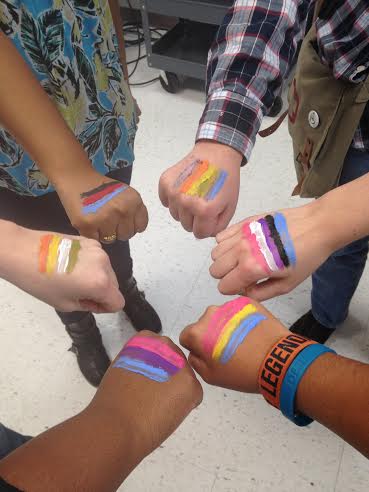Erasure of “Lesser Known LGBTQ Identities” An Issue

Students showing solidarity and recognition of their ignored sexual, romantic, and gender identities, by painting their respective flags on their hands. –Melanie Atzili
January 10, 2015

When most people hear the acronym LGBTQ+, they can easily conjure up mental images of Ellen DeGeneres and Neil Patrick Harris. Unfortunately, people identifying with any group outside of the often-recognized “gay” and “lesbian” are usually left behind in the dust.
Yes, the existence of their groups are getting more acknowledgement, as occurred when the dating website OKCupid expanded its list of gender and sexuality options, and when members and allies of the queer community began foregoing the traditional LGBTQ+ in favor of the acronym “mogai” (marginalized orientations, gender and intersex). Despite this progress,though, people of lesser-known sexual orientations and gender identities often face erasure, in which they are told that their identity is “not real” or somehow “invalid.” It is imperative that both society as a whole and people within the LGBTQ community begin to recognize and include members of marginalized non-cishet (cisgender and heterosexual) groups.
Even those of us who possess a vague idea of what it means to be bisexual, pansexual, asexual, aromantic, polyamorous, intersex, transgender, bigender, agender or genderfluid (to name a few) are not always immune to the misconceptions that pervade our culture regarding these lesser-known identities.
The myths about bisexuals (people attracted to two genders) and pansexuals (people attracted to all genders) alone could fill a short book. Some common fallacies are that bisexuals are somehow “confused” or “greedy”. According to senior Maria Ramirez*, who identifies as bisexual, members of her community are also often labeled as excessively promiscuous or more likely to commit adultery. “[In reality], the risk of your significant other cheating on you is just as likely in any relationship,” Ramirez said.
Ramirez discovered her bisexuality at the age of 11, and came out to her friends and boyfriend when she was 13. “I don’t think they were completely sure that I was sure,” she said on the subject of revealing her sexuality. While Ramirez understands that bisexuality is a difficult concept for some to grasp, she wishes that she would not have to continuously emphasize how she is not just experimenting with both men and women due to her “inability to choose” between being straight and lesbian.
Ramirez recalls having to come out to her mother three times before she could understand what it meant to be bisexual, a problem she attributes to her mother’s foreign upbringing. “I don’t think she was exposed to other sexual orientations in her home country a�� in Peru,” Ramirez said.
Moving on from sexuality, gender identities outside of the male-female binary system have proven to be another concept that is tough for many people to wrap their heads around. However, it shouldn’t be. It’s just not as clear-cut as “men and women”.
Some people identify with a different gender every day or couple of days (genderfluid), with a varying mixture of male and female (bigender) or with no gender at all (agender). Also, people who don’t identify as explicitly male or female will sometimes prefer to use gender-neutral pronouns such as they/them/their, ey/em/eir or ze/zem/zir.
It is essential that we make our social spaces more queer-inclusive by educating our friends and family members about the numerous lesser-known gender identities and sexual orientations, as well as by taking care to use a person’s preferred pronouns in situations where they are out to everyone there.
Junior Lily Gerstel knows how it feels to deal with family members and friends who have a hard time accepting gender fluidity. “My mom, she just didn’t understand it. She thought it was because I had low estrogen levels,” Gerstel said.
Though Gerstel found plenty of support in her sister Alana (a freshman at RHS), who taught her how to tie a tie, and her friend freshman Luke Guthrie, who donated a large amount of men’s clothing to her, she was not so lucky with her other friend. Gerstel attempted to explain the importance of her preferred name, Lee, several times to this friend. “He tried a couple times, but then he just gave up,” Gerstel said.
Gerstel feels much more at ease with herself after having discovered the genderfluid label, and takes pride in her identity. Even though she eventually obtained acceptance from her family, friends and teachers, she wishes society as a whole would drop its narrow-minded conceptions of gender. “It’s like, “Pick onea��, but I’m both a�� I hope people a�� will understand it after a while a�� not think it’s abnormal,” she said.
We as a society can do a much better job than we are doing now of embracing identities that don’t correspond with our own, including identities that we may not be as familiar with. Do you support same-sex marriage? That’s great, but it’s not enough. Have you heard people using LGBTQ to refer to only gays and lesbians? That behavior is actually demeaning and hurtful to people of lesser-known sexual orientations and gender identities. What’s really important is that we use our justice-minded voices to speak with (and not over) all non-cishet individuals in their tireless campaign for acceptance.
*Maria Ramirez is a pseudonym used to protect the identity of one of the students interviewed.


